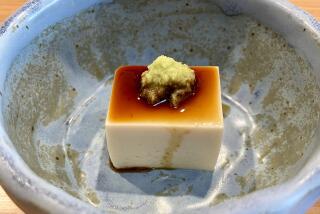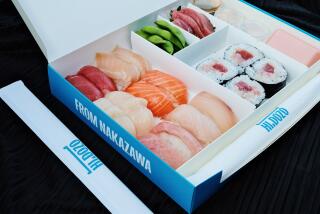Tokyo Tofu Firm’s ‘Bacteria-Free’ Sales Pitch Irks U.S. Competitors : Food: American companies, which sell the product fresh instead of packaged, say their rival’s focus on possible spoilage hurts the whole industry.
- Share via
Japanese and American tofu manufacturers, eager to put more tofu on American tables, have increased marketing campaigns aimed at boosting sales of the soy curd.
They are aligning themselves with cookbook writers, health food publications and even the weightlifting trainers at Gold’s Gym.
But the aggressive approach taken by Tokyo-based Morinaga Milk Industry Ltd., one of Japan’s largest dairy companies, has angered many U.S. tofu makers.
Morinaga’s sales people are telling grocers that the company’s aseptically packaged Mori-Nu tofu is fresher and safer than traditional water-packed varieties. The aseptic--or bacteria-free--package resembles the rectangular juice boxes so popular with American kids. “One of the main problems of tofu in America is its obsolete packaging,” said Arthur Mio, national sales manager for Mori-Nu in Los Angeles. “Tofu is a highly perishable food product, and if it’s not kept cold enough, it sours and grows bacteria.”
Representatives of water-packed tofu companies say that when Morinaga sales people criticize fresh tofu, they create a negative image for the entire tofu industry.
“They are hurting the whole industry with their ads,” said Bill Mizono, president of Azumaya, a San Francisco maker. “There is room for Mori-Nu’s product side by side with water-packed tofu.”
Mio said he is aware that the water-packed competitors are upset, but he said Mori-Nu stands by its claims. He said sour-tasting tofu is the bane of the industry, especially outside of California, where grocery stores are not as aware of the need to properly refrigerate it.
“We are a real threat to an obsolete form of packaging,” said Mio, whose product slogan is “Tofu for the American Taste.”
“Our position is, ‘Why not take advantage of technology?’ ”
Fresh tofu, traditionally pasteurized and packed in water, is destined for sale in the produce or deli section of the supermarket. Mori-Nu’s patented process involves pouring a mixture of soy milk, water and a food starch into individual cartons. The cartons are sealed and dipped in a hot water bath to start the coagulation process.
The tofu forms inside the sterile package, which is designed to block out light, oxygen and bacteria. Mori-Nu says its aseptic package has a shelf life of 10 months, compared to fresh tofu’s shelf life of about 30 days.
But Azumaya President Mizono said there has never been widespread problems with tofu spoilage, although once in a while a customer will return a soured package. He said he complained directly to Morinaga Milk President Akira Ono, but has seen no change in marketing tactics.
Al Medina, a senior environmental health specialist for the Los Angeles County Health Department’s food and milk division, said he hasn’t had a complaint about tofu or a tofu manufacturing plant for at least 18 months.
Tofu, a staple in many Asian countries, is low in calories, high in protein, easy to digest and adaptable to all kinds of recipes because it readily absorbs flavors.
In the past five years, the American market for tofu has grown steadily, with retail sales of about $75 million last year, according to industry observers.
There are about four large and 150 small tofu makers across the country. Exact sales figures are difficult to obtain because most tofu companies are family-owned or privately held.
“Until 1985, American tofu companies were trying to figure out how to produce tofu,” said William Shurtleff, author of “The Book of Tofu” and president of the Soyfoods Center in Lafayette, Calif. “Now, the companies are interested in marketing and new product development.”
To acquaint Americans with the benefits of tofu as a milk and cheese substitute, Mori-Nu stresses its value as a prime ingredient in fruit shakes, in dips for vegetables and as a substitute for the ricotta cheese in manicotti.
One promotional piece features recipes for pineapple cinnamon and strawberry banana shakes, a 15-cents-off coupon and a form to order tofu by mail. The ad touts the convenience of Mori-Nu’s package and encourages consumers to take it with them anywhere because it needs no refrigeration until opened.
The company sells a colorful “Tofu Magic” cookbook for $7.95 and a video version for $9.95. Mori-Nu also offers $5 memberships in its “Health for Life” club. Members receive a quarterly newsletter featuring recipes, coupons and nutritional information. So far, about 10,000 people have signed up. To reach the fitness-conscious consumer, Mori-Nu sponsored the “Southern California Natural Bodybuilding Championship,” which required participants to take a lie detector test as proof that they were not taking steroids or other drugs.
Hinoichi Tofu, a manufacturer in downtown Los Angeles, is working with Jackie Olden, a radio and television personality, to help take some of the mystery out of cooking with tofu.
“Hinoichi’s goal is to gain greater trial and repeat purchase of tofu among mainstream American consumers,” said Donald Potter, a marketing consultant for the company. Potter suggests that consumers try both fresh and aseptically packaged tofu to compare the taste.
Nasoya Foods of Leominister, Mass., offers flavored tofu, including a French Country herb version for use in dips. It also sells a mayonnaise-like product called “Nayonaise,” which is fat- and cholesterol-free.
And the company’s newest line of products features Italian foods such as ravioli and tortellini made with tofu, according to a spokeswoman. Nasoya pasteurizes its tofu and sells it in a sealed package promising a shelf life of about 50 days.
More to Read
Eat your way across L.A.
Get our weekly Tasting Notes newsletter for reviews, news and more.
You may occasionally receive promotional content from the Los Angeles Times.








